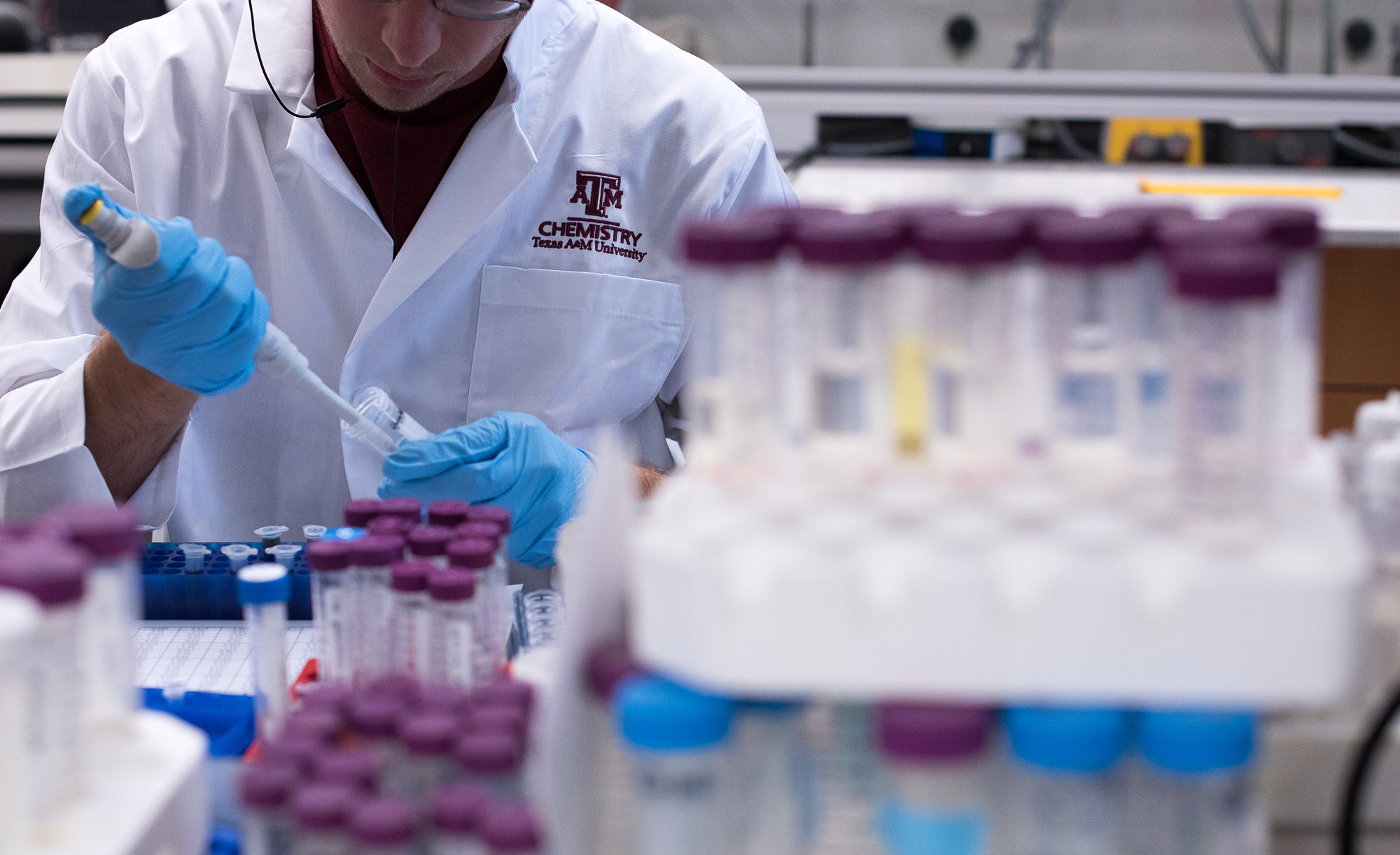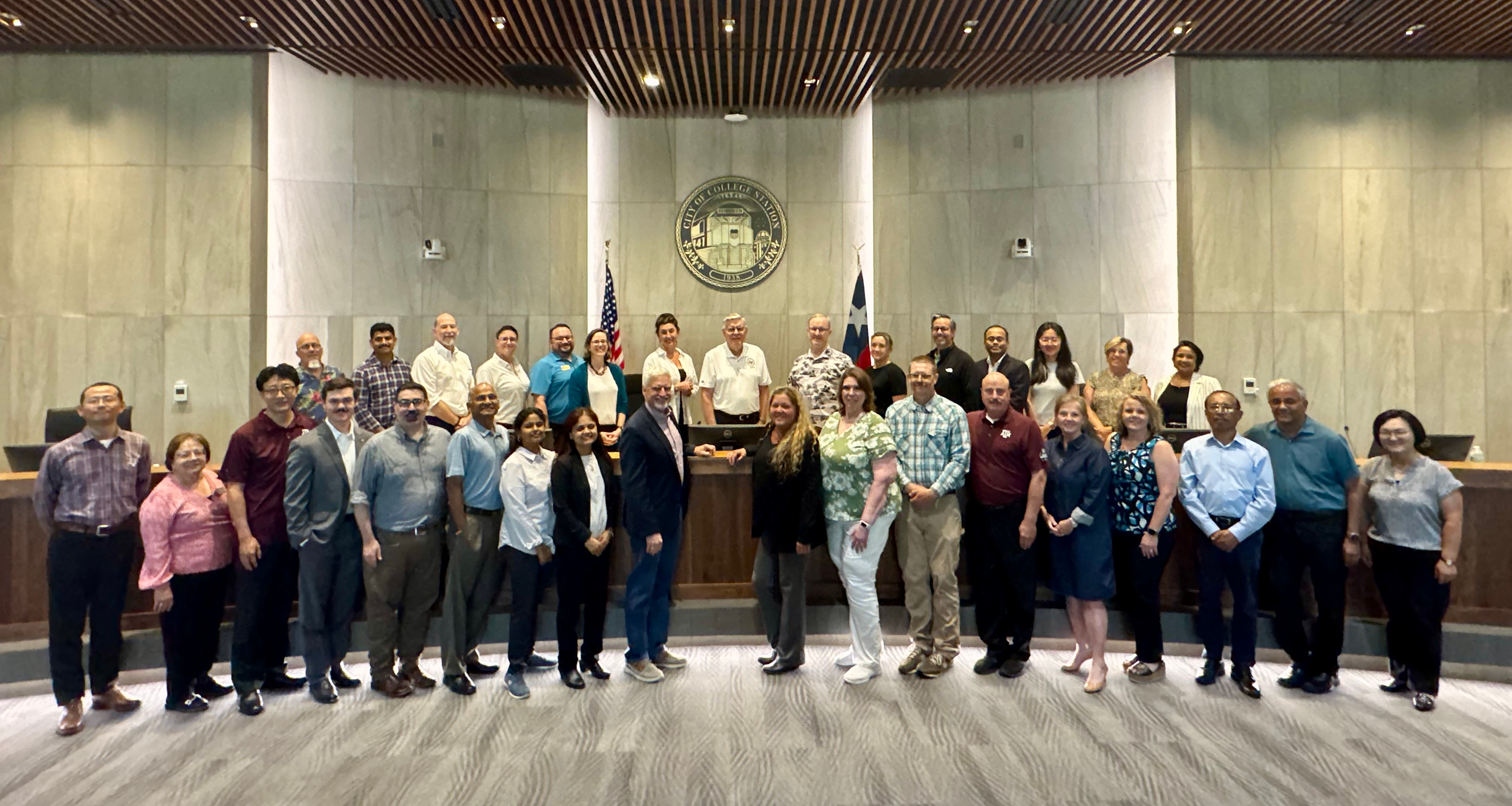
Texas A&M University, the leader of a statewide initiative, has been named a semifinalist in the National Science Foundation’s (NSF) Regional Innovation Engines competition. The Texas Chemical Transition Engine (TCTE) brings together more than 50 organizations from across the entire state of Texas in an ambitious effort to reimagine how the United States harvests, produces, uses and recycles chemicals.
At its core, TCTE aims to create an integrated circular economy model that expands the capacity and complexity of chemical supplies originating from oil and gas, to include new chemical feedstocks derived from the conversion of agricultural waste and plastic pollution, and from the capture of contaminants during the purification of water. A focus is on the translation of research and development processes that harness and transform underused resources into high-value, sustainable chemical products. This initiative builds from the state’s traditional strengths in oil & gas and agriculture, and positions Texas to continue to lead globally as a hub for chemical manufacturing, job creation and innovation-led economic development.
Such bold ambition requires an operationally effective ecosystem comprised of academic, industrial, investment, government, community and public stakeholders and partners. Led by renowned chemistry professor and National Academy of Sciences member Dr. Karen Wooley of Texas A&M University and supported by co-principal investigators from Integrity BioChem, Rice University’s Baker Institute, the University of Houston, and others, the project is grounded in the belief that science and industry, working together, can solve major technological challenges while building a larger, stronger and more resilient economy. Together, they aim to build a bold new ecosystem that turns chemical waste — including agricultural leftovers and plastic pollution — into valuable, sustainable chemical products. The team also plans to grow the chemical workforce, expand U.S. chemical production, and help secure the country’s supply chains for the future.
“This isn’t just about chemistry — it’s about creating jobs, protecting our environment, and strengthening U.S. industry,” Dr. Wooley said. “Texas has the resources, the talent, and the momentum to lead this transition.”
"At Texas A&M, we believe in bold ideas that deliver real impact, and the Engine is one of those ideas – transforming waste into value, growing jobs and securing our state and nation’s future,” General (Ret.) Mark A. Welsh III, president of Texas A&M University, said. “We stand poised to support the federal government's efforts to fortify our energy supply through innovation, ingenuity and Texas-sized solutions."
A Statewide Engine with National Potential
Texas is uniquely positioned to lead this effort. As the country’s largest chemical-producing state and home to the most farmland acreage in the U.S., Texas offers the infrastructure, workforce and supply chains needed to develop and scale next-generation chemical technologies. TCTE’s approach links rural agricultural regions with industrial urban centers to deliver statewide benefits, from new manufacturing jobs to regional business development.

TCTE is designed to deliver broad, lasting impact by driving innovation from the lab to the marketplace. At its heart, the project aims to create thousands of quality jobs across both urban centers and rural communities, while building a robust talent pipeline through education and hands-on workforce training. By converting research breakthroughs into real-world solutions, TCTE will attract private-sector investment and accelerate commercialization, fueling the growth of new businesses and industries. The initiative also tackles urgent environmental challenges by reducing waste and pollution through advanced recycling and sustainable chemical technologies. Critically, it will help strengthen U.S. supply chains, reducing reliance on imported materials and positioning Texas as a cornerstone of a more secure manufacturing future.
“This project is about building a larger, stronger and more secure chemical industry-by building upon strengths in oil & gas and agriculture, and harvesting chemical feedstocks from variety of sources to provide advanced chemical capacities and complexities to drive new technologies facilitated through the creation of this science-technology-economy engine for Texas and the nation — one powered by sustainable innovation,” Dr. Wooley said. “We’re taking waste and turning it into opportunity. We’re taking ideas and turning them into impact.”
Driving Texas Forward
TCTE aligns with the NSF’s vision of fostering regional innovation that delivers national outcomes. By connecting public universities, private industry, local governments, and community partners, TCTE is designed to ensure that every region of Texas — from the Gulf Coast to the Panhandle — shares in the benefits of a more competitive chemical industry.
The NSF Regional Innovation Engines program received ca. 300 letters of intent from across the country. TCTE’s selection as one of just 29 semifinalists places it among the most promising and transformative initiatives currently under consideration. Awardees are expected to be announced in early 2026 following further final round evaluations in late 2025.
With its strong foundation in Texas’s economic and scientific strengths — and a coalition dedicated to real-world impact — TCTE is charting a path toward a more prosperous future for Texas and for the nation.
Background
Chemistry is the central science, the science of the molecular scale, involving matter at the most fundamental level, with enormous importance and impact in enabling and driving all advanced technologies of modern society. It is common knowledge that chemicals serve as fuels to provide energy, as fertilizers, herbicides and pesticides to provide and protect food supplies, as detergents, soaps and disinfectants to provide hygiene, as pharmaceuticals and other products that contribute to health, and in other roles that are vital to humans daily. Less well known are the roles that chemical processes and chemical components play in the manufacture, structure and performance of critical technologies, including microchips that drive computing power and facilitate the advancement of AI, batteries that store the energy needed to power the future of society, and even weapons that defend our democracy. Securing the U.S.’s continued position as a global leader in chemical manufacturing will avoid a future in which the U.S. may become reliant on other nations for important chemicals and their supply chains that provide for the health, welfare, prosperity, and benefit of the U.S. people, economy, and environment.

